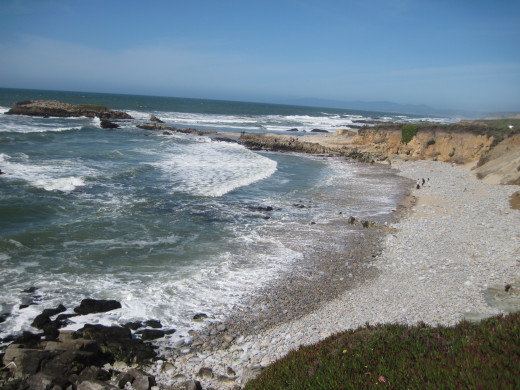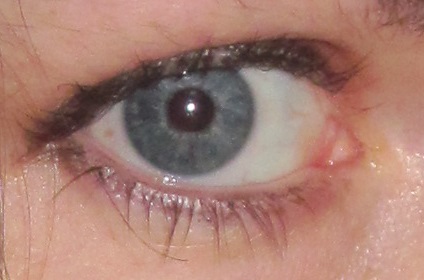What Can You Learn from a Cormorant?

The beach is one of the best places I know of for meditation; particularly here on the Pacific Coast, where the shoreline is still relatively unspoiled and belongs largely to the wild creatures of the sea. The rhythmic pattern of the tides and waves is perhaps one of the biggest reasons for this; there is something deeply comforting in losing oneself in the larger patterns of the world, at least for a little while, vaguely aware of your breath and pulse finding synchronicity with the breath and pulse of the ocean and moon.
The wild birds, seals, crabs, and other marine animals so abundant at the beaches here are fascinating to observe - as well as often adorable to the point of making any girl squeal, of course.
One type of bird I see here that I never saw in the wild before coming to California is the cormorant - usually Brandt's cormorant. The topic of this post is what I learned from observing these birds at the beach recently; they have a lot to teach, as well as being fun to watch.

Defining Trust
Cormorants, like many sea birds, are expert wave-riders. Riding the waves takes trust; trust in your own ability not to be overwhelmed by them, and trust in the ocean as well. But what can it mean to trust the ocean? Seafarers have always spoken and sung of the ocean’s caprice, its essential unpredictability and resulting danger. Does this not mean the antithesis of trust is more appropriate?
Not if we’re sensible about defining trust. Our culture has a silly idea – which I blame on organized religion and politics, both sincerely and on general principles of tongue-in-cheek – that trust is blind; blind here also having a connotation of ignorance. That is the kind of trust most Americans think of instinctively when they think of trust. This, however, I believe to be an error in judgment on many levels.
Consider the concept of trusting the sea: a blind, uninformed surrender to the elements while claiming to ‘trust’ the sea not to do whatever you do not wish her to is simply foolish – and will eliminate some fools from the genepool should they attempt it. This is not how any sea creature approaches their home; no, when cormorants trust the sea, for example, it means they believe the ocean will continue to behave according to its character. The tides will rush in and rush out again; waves will buffet the shore; other elements will influence the violence or calm of the ocean’s temper. In response to this understanding of their home, they tailor their behavior to live in harmony with the eternally restless, changing, yet unvarying sea.
Elder son, standing in one of our preferred meditation spots.

Share your Favorite
What's your favorite marine animal?
Oncoming Waves
When cormorants find themselves faced with an onrushing wave where only gentle swells had been just a moment before, they don’t panic; they do not strive to stay on top of the water where there is air and light – they do what to many of us would seem counterintuitive; they dive straight into the chaos and darkness, ducking beneath the wave just before it crashes down on them, often surfacing somewhere entirely unexpected several moments later.
Life is just as unpredictable as the sea; none of us knows with any degree of certainty what tomorrow will bring us, though we do know that one of our tomorrows will assuredly bring us death. Between then and now, we simply ride the waves as best we can – and those of us determined to try to make the ocean (or life in general) be and do what we want it to be, rather than accepting it for what it is and trusting it to be true to its own nature, will not fare happily.

Inner Narratives
This is applicable to many areas of life; for instance, we are each the star of our own movie, the protagonist of our own plot – in some small way narcissistic tendencies come to us naturally. Riding the waves smoothly includes recognition of the fact that I am the only one whose life revolves around me. Every other person on the planet is equally absorbed in his or her own sphere, though we overlap into one another’s spheres as social creatures.
When we expect other people to see us the way we ourselves do, we’re failing to ride the waves gracefully, and we’ll find ourselves taking some rough tumbles into confusion and pain.
One thing I have learned is that I have no control over anyone else’s inner narrative; he or she will cast me as the sidekick, the comic relief, the love interest, or yes – the villain – as he or she sees fit. That’s their right, as it is mine to either agree or not to agree with their casting choice. It helps to realize that none of us has an unbiased narrative; we all perceive life subjectively.
So when I am shocked at someone’s characterization of me, believing it to be unfair, it’s time to dive into that dark wave of what I believe to be a lie, or at least a twisting of the truth; accept that this person probably believes sincerely that I am as they paint me. At the same time, I can rejoice that I need not accept the role in which they perceive me if I can honestly deem it unjust or inaccurate.

We all face this situation at some point; when it comes to me, I believe it behooves me to look carefully at my actions, to see if the person villainizing me is actually justified in their portraiture, however short it falls of my own perception; we all do wrong at times, so there will be many cases where my pride suffers and I need to apologize, to correct and if possible atone.
However, there will also be many cases where I can clear myself of wrongdoing, at least in my own heart. When my actions seem right and good to me, despite how they are perceived by others, I can learn to accept two things: First, the fact that they will never see it my way. Second, the fact that I have no obligation to see it their way.
So long as I am at peace with my conscience, the fact that someone else believes something terrible about me need have no damaging effect. I have no need to go on the defensive, insisting on ‘setting the record straight’ in order to preserve a reputation I really have little control over in any case.
This is easier said than done, at first; but the longer we practice riding the waves, the more adept we become.
Deep peace of the running wave to you all. /|\









